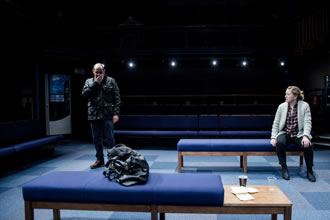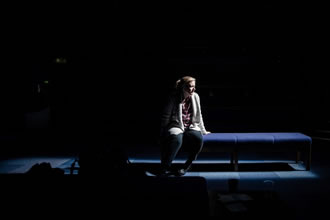Tears before, during and after bedtime…

Claire Price and Zubin Varla in this painfully intimate portrayal of a ruined marriage
|
What can it feel like performing before a tear-stained front-row audience whose feet occasionally entangle yours? That’s the lot of actors Claire Price and Zubin Varla in this painfully intimate portrayal of a ruined marriage. Good theatre is about reflecting universal truths and it’s a universal truth that even the best-intentioned and most-committed relationships may not survive the trauma of losing a child. Mental equilibrium may not survive either.
Dutch writer Lot Vekemans (translated into English by Rina Vergand), poignantly and beautifully captures the yawning gap that opens by those who suffer this worse of losses. What was once a cosy couple island, surrounded by a sea of everyday life which, at worse, threw a few waves its way, cracks open like Krakatowa. The couple becomes two separate entities, barely human, clinging each to their own wreckage.

Poison is set in an anonymous waiting room. Designer Simon Daw has neatly chosen that ubiquitous Pacific blue fabric and hairy carpet tiles of places where strangers sit side by side and where the hoped for atmosphere is one of calm: a hospital waiting room or, as here, the visitors’ room at a cemetery. A man (Zubin Varla) waits, apparently lost in thought, until a woman (Claire Price) enters, slightly flustered. Both 40-somethings, they appear to know each other, but it’s as if an invisible third figure has also entered, creating an almost physical space between them. Their words can only circle this space, never getting closer, never really being understood in the way that they were sent out in exploration.

The extraordinary mobility of Claire Price’s face and tiny body movements means that she can take you into her character’s mind. With the merest widening of her eyes and shift of her shoulder you can feel she is being torn internally limb from limb. In contrast the man is apparently calm, concerned but totally rational. Here to solve a problem. A manly man solving a problem. Until he too breaks.
The next hour and 20 emotional minutes covers the past 20 years of their lives, nine of them apart, and the differences in how thoughts of the other have occupied each character’s mind. And so they try to talk. Each trying to avoid stepping where the pain is at its most unbearable and yet wanting another living being to share that pain.
Anyone who has ended up parted from someone they once expected to spend the rest of their lives with will recognise the manoeuvres, the mistakes made, the regrets, and the hopes, in this superb dialogue. If there is any criticism that weakens the play it is that we have no background on the woman’s character to explain her choice of, if not thriving, at least living on despair. The sudden disappearance of her husband from her life years ago only goes part of the way. The man is visiting his mother, to whom he appears close. Maybe that mother’s love is a clue to his choice to go forward, to take new risks with life.
The enigmatic ending can be read in many ways. At its most hopeful, the woman, having finally discovered she has been wilfully blind rather than hopeful, can now go forward. Whichever ending you choose to see in it, it’s well worth joining these two in that Pacific blue room.
Liz Vercoe
Photos:
Richard Davenport
November 9, 2017